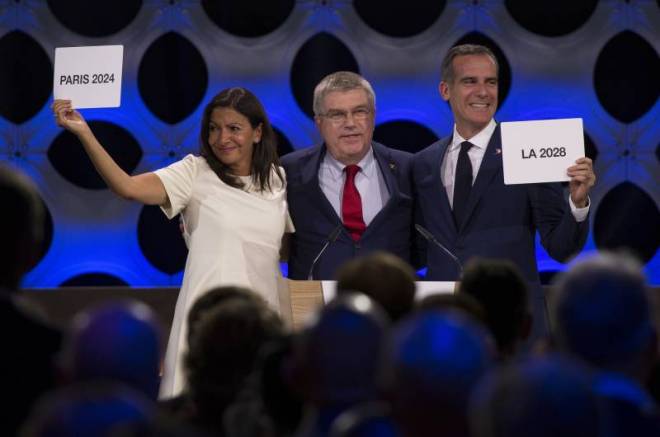LIMA, September 2017 – Paris has officially been awarded the hosting rights of the 2024 Olympic and Paralympic Games, while Los Angeles was confirmed as the host of the 2028 Games.
The decision was confirmed at the 131st IOC Session in Lima that saw members of the International Olympic Committee vote unanimously to ratify the historic tripartite agreement that confirms a double allocation of the 2024 and 2028 Olympic Games.
The idea of a double allocation of the 2024 and 2028 Games was first brought forward by IOC President Thomas Bach in June this year and approved by the Executive Board, before the proposal was also unanimously confirmed by the Extraordinary IOC Session in July.

On July 31, Los Angeles Mayor Eric Garcetti announced that his city had transferred its bid to the 2028 Games in agreement with the IOC. The Session in Lima would serve to ratify the tripartite agreement between the Paris and Los Angeles bids and the US and French Olympic Committees.
And there were no surprises in Lima on Wednesday as, after a unanimous show of hands from IOC members, Thomas Bach presented Mayors Anne Hidalgo and Eric Garcetti with their respective Paris 2024 and LA 2028 cards, no envelopes necessary and no losers, but rather a win on all sides for the two cities and the IOC.
The decision will see Paris host the Games for the third time on the 100th anniversary of its 1924 Olympics. The city had previously hosted the Games in 1900.
Los Angeles will be hosting the Games in 11 years time, with head of the 2028 Evaluation Commission Patrick Baumman previously assuring IOC members that “the benefits of awarding the Games to Los Angeles 11 years ahead of time far outweigh any possible risks.” Baumman confirmed letters of support from the United States Federal Government, the Senate of the State of California, and the City Council of Los Angeles.
IOC Vice President John Coates had previously outlined the details of the tripartite agreement that made the 2024 and 2028 allocation possible, with with both him and IOC President highlighting the outstanding nature of both bids and the golden opportunity they presented to the IOC.
This was followed by final presentations to the IOC by the delegations of Paris and Los Angeles, with both focusing on the new Olympic era that the allocation represented and the promise of continued cooperation between the two cities and their organizing committees.
Paris 2024
An emotional Anne Hidalgo and French IOC member Guy Drut confirmed the focus on preserving and sharing Olympic values and improving both the movement and all of Paris, France and byeonf with the hosting of the 2024 Games.
“The Olympic values will be at the heart of our common action for international solidarity with refugees, social business, education. One driving force: Paris together with Los Angeles, one catalyst: the Olympic and Paralympic Games. Together, we will speed up the reinvention of two world Cities through the power of sport and the Olympic values,” Mayor Hidalgo said, also citing the importance of climate change.
LA 2028
The Los Angeles 2028 team led by CEO Casey Wasserman emitted the relaxed confident nature the bid had been centered around from the very beginning, with Wasserman explaining the fact the majority of the bid team were in sneakers and no ties is exactly “the unique brand of California-cool that we will bring to the 2028 Games.”
Mayor Eric Garcetti highlighted the Olympic legacy Los Angeles would bring having hosted a successful previous two editions of the Games in 1932 and 1984.
“Los Angeles loves the OIympics because the Games have lifted up our city twice before. But to us the Games have always represented an even brighter future and the chance to harness the power of sport and the Olympic Movement again to inspire the next generation – for the next 11 years and beyond.”
This marks the second time that two Olympic Games were awarded in the same instance following the award of the 1924 Games to Paris and the 2028 Games to Amsterdam decided at an IOc Congress in Lausanne in 1921 by Baron Pierre de Coubertin.











You must be logged in to post a comment.